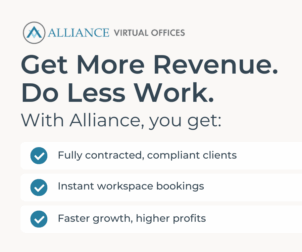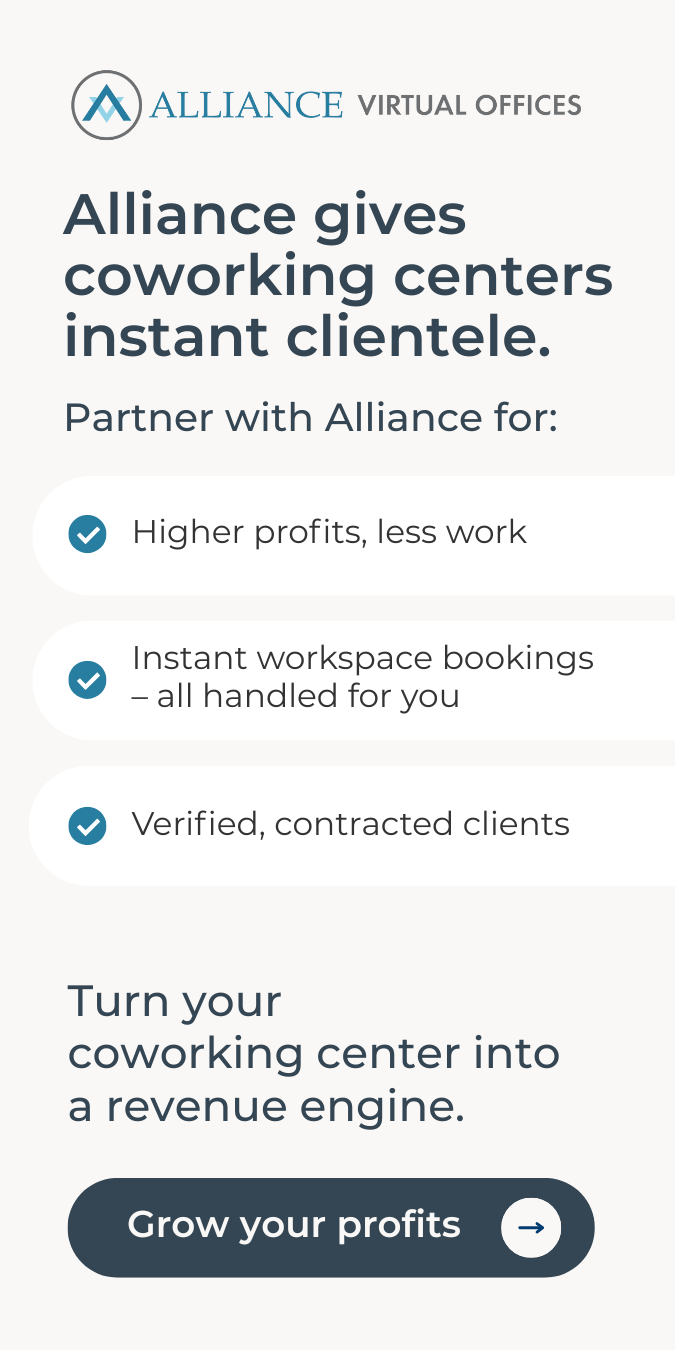- By 2030, JLL predicts that 30% of all office space will be flexible.
- Regus, Industrious, and HQ collectively added 39 new spaces nationwide in Q2 2024.
- WeWork experienced an 8% decrease in overall inventory but remains strong within the top 25 U.S. markets as it emerges from Chapter 11 bankruptcy.
Table of Contents:
The coworking industry, unlike many other sectors, has remarkably demonstrated resilience in the face of 2024’s economic challenges and uncertainty.
The overall growth from leading providers including IWG and Industrious reflects the rise of flexible work environments. In 2024, coworking’s core benefits of greater flexibility and cost efficiency — both of which have become more highly sought after by organizations this year — has supported healthy growth and opened up unique opportunities for even niche industries such as biotechnology and pharmaceuticals.
The data presented below is a snapshot of a sector that has not only expanded, but is also influencing commercial real estate and future of work trends in a profound way.
Coworking Industry Statistics and Trends
Industry Adoption and Demographics
Global coworkers reach 5 million as flexible office space expected to hit 30% by 2030
The number of coworkers worldwide has reached an estimated 5 million due to the growing popularity of flexible work environments (Shortlister). By 2030, 30% of all office space is projected to be flexible, which is a massive jump from just 2% in 2023 (JLL). This trend reflects the increasing demand for adaptable workspace solutions as companies and employees continue to embrace hybrid and remote work models.
Millennials dominate coworking spaces
The average coworking member is 36 years old (Zippia). It’s estimated that Millennials account for 61% of all members, reflecting their strong generational preference for flexible work environments.
Women now make up around 46% of all coworking members
Women account for around 46% of all coworking space members, and this number is steadily increasing as coworking spaces continue to provide supportive and flexible work environments (Gitnux).
80% of coworking members hold college degrees, but younger workers are changing the trend
Globally, 80% of coworking space members hold a college degree, indicating that these environments continue to attract college educated professionals (Zippia). However, this percentage has been gradually declining as more young workers without degrees enter the workforce and seek out coworking spaces. This trend suggests that coworking is increasingly appealing to a broader range of professionals, not only those with formal higher education.
Coworking spaces serve a wide range of industries beyond tech startups and freelancers
Flexible spaces have successfully expanded beyond the perception that they were primarily environments for startups and freelancers. There are now many versatile work hubs catering to a wide variety of industries (OfficeRnD). The top 10 industries most commonly adopting use of coworking spaces are:
- Technology Start-Ups
- Entrepreneurs
- Creative Industries (writers, artists, designers)
- Software Development
- Consulting
- Financial Services
- Insurance
- Legal Services
- Nonprofits
- Arts and Culture
Regional Market Trends
Global coworking spaces to reach nearly 42,000 by the end of 2024
By the end of 2024, the number of coworking spaces globally is expected to reach 41,975, reflecting the persistent demand for flexible work environments worldwide (Statista).
Europe’s flex office market grew by 4% in 2023
The flex office market in Europe grew by just under 4% in 2023, adding around 300,000 sqm of flex stock, maintaining its share at approximately 2.5% of the total office stock (CBRE). The European markets are expected to grow at a compound annual growth rate of more than 4.7% from 2024 to 2029 (Modor Intelligence).
Asia Pacific flexible office space grew by 3.9%, reaching 89 Million Sq. Ft., in first half of 2024
The Asia Pacific flexible office space market saw a steady increase in the first half of 2024, with the total volume reaching 89 million square feet by June. This was a 3.9% increase from December 2023 (CBRE).
Flexible space now accounts for approximately 4% of the total office stock and 3.2% of Grade A office stock across 20 major Asia Pacific markets. The steady growth reflects the region’s growing adoption of flexible work environments.
Latin America sees 29% growth in flexible workspace demand, led by Mexico City’s 163% surge
Demand for flexible workspaces in Latin America grew by 29% overall, driven largely by a 163% year-over-year increase in Mexico City (The Instant Group). This surge underscores the growing popularity of hybrid and remote work options in the region, with Mexico City emerging as a key hub for offering coworking solutions. The rapid expansion in this market highlights the trend towards more adaptable work environments across Latin America.
Nationwide Market Growth
British Isles surpass 3,000 coworking spaces as flexible work rises
In the British Isles, the total number of coworking spaces surpassed 3,000 by Q2 2024, coinciding with the Isles’ widespread adoption of these flexible workspaces (Coworking Cafe). The U.K. alone is home to over 2,800 coworking spaces and Ireland accounts for slightly more than 200 spaces.
London sees 12% spike in private office pricing amid drop in occupancy, as U.K. market embraces longer contracts
The U.K. office market is seeing a mix of trends as businesses cater to new workplace needs. London’s private office prices have surged by 12% year-over-year to £805 per month, despite occupancy falling to 82% (Workthere).
Meanwhile, markets outside London show steadier growth, with pricing up just 1% to £379 per month and occupancy slightly higher at 83%. A notable industry trend is reflected in the average contract length, which increased by 27% to 15.6 months, indicating businesses are committing to flexible spaces for longer periods, signaling hybrid work as a long-term strategy. (Workthere)
- Private Office Pricing:
- London: £805/month (12% YoY increase)
- Rest of U.K.: £379/month (1% YoY increase)
- Occupancy Rates:
- London: 82% (down from 88% in H1 2023)
- Rest of U.K.: 83% (down from 86% in H1 2023)
- Contract Terms: Average length increased to 15.6 months (27% YoY increase).
Dublin's coworking market outpaces traditional office space, driven by small business demand
Dublin's coworking and flexible workspace market is outperforming traditional office spaces, with a strong preference for smaller, flexible office solutions (Irish Independent). According to CBRE data, companies seeking up to 25 desks accounted for 82% of the city's high demand.
Dublin's flex market continues to achieve strong take-up rates, competitive rents, and lower vacancy levels compared to the overall office market, highlighting its growing appeal in the city's evolving workspace landscape.
Los Angeles, Dallas-Fort Worth, and Manhattan lead U.S. in total coworking spaces as demand expands across the country
Data on the distribution of coworking spaces across major U.S. cities shows a maturing market driven by diverse demand. The growth in regions such as Denver, Atlanta, and Houston reveals that coworking is no longer confined to coastal tech centers, but is now part of business strategies nationwide. (Coworking Cafe).
- Los Angeles: 279 spaces
- Dallas-Fort Worth: 271 spaces
- Manhattan: 264 spaces
- Washington, D.C.: 258 spaces
- Chicago: 243 spaces
- Denver: 227 spaces
- Atlanta: 226 spaces
- Houston: 222 spaces
- Boston: 202 spaces
- New Jersey: 171 spaces
- Miami: 142 spaces
- Phoenix: 138 spaces
- Seattle: 137 spaces
- Philadelphia: 137 spaces
- Bay Area: 124 spaces
- San Diego: 122 spaces
- San Francisco: 120 spaces
- Orange County: 116 spaces
- Minneapolis-St. Paul: 98 spaces
- Raleigh-Durham: 94 spaces
- Nashville: 90 spaces
- Austin: 82 spaces
- Brooklyn: 80 spaces
- Indianapolis: 76 spaces
- Salt Lake City: 75 spaces
U.S. coworking space grew to 127.7 Million Sq. Ft. in Q2 2024, led by Manhattan
The coworking sector in the U.S. expanded by 2% in Q2 2024, reaching a total of 127.7 million square feet of workspace (Coworking Cafe). Manhattan leads as the top market with 11.89 million square feet, followed by Los Angeles at 6.5 million square feet and Chicago at 6.33 million square feet.
This growth highlights the increasing role of coworking in the commercial real estate landscape as companies continue to adopt flexible work models. New York City also remains a major hub with over 160 flex workspaces in its central business districts, despite a 10% reduction in the number of spaces in Midtown Manhattan and the Financial District (JLL).
U.S. coworking industry adds 444 new locations in second quarter of 2024
In the U.S., the coworking industry grew in Q2 2024, with 444 new spaces opening across the country. This expansion brings the total number of coworking locations to 7,041 locations across the country (Coworking Cafe).
India's flexible workspace providers transition to property ownership as demand surges
In response to pressing demand for flexible workspaces, Indian coworking companies are increasingly moving away from traditional leasing models to fully acquire properties. Companies like Table Space, Bhive, Indiqube, and EFC are leading this trend, seeking greater control over their offerings (Allwork.Space). The market for flexible office space in India is expected to grow from 55 million square feet to between 100-140 million square feet by 2030.
Coworking Operators
International Workplace Group (IWG), experiencing record growth, tops $2.1 billion revenue in first half of 2024
IWG, a global leader in flexible workspaces, reported a record $2.1 billion (£1.65 billion) in revenue for the first half of 2024 as the demand for hybrid work solutions increases (London Stock Exchange). The company also achieved a 13% increase in adjusted EBITDA, reaching $274 million (£215 million), and saw a 19% year-over-year growth in room signings. The firm has aligned financial practices with U.S. standards, transitioning to dollar reporting and reducing net debt to $768 million (£601 million) (Allwork.Space).
Top brands added 39 new spaces in U.S. in Q2 2024
Leading coworking operators Industrious, Regus, and HQ collectively added 39 new spaces across the U.S. in Q2 2024, reflecting continued growth in the flexible workspace sector (Coworking Cafe). Notably, HQ increased its inventory by 13%, demonstrating a strong expansion push within the competitive coworking market. These developments highlight the sustained demand for coworking solutions as hybrid work continues to shape workplace strategies.
WeWork experienced an 8% decrease in inventory
WeWork remains a key player in the top 25 U.S. markets post-Chapter 11 bankruptcy despite its 8% decrease in inventory (Coworking Cafe). It continues to maintain notable leases globally, like its recent deal with South Korean automotive giant Hyundai. WeWork’s global footprint consists of around 600 properties (BisNow).
Pricing Insights
U.K. and Ireland see varying coworking prices, with London and Dublin leading in costs
Coworking subscription costs in the U.K. and Ireland display significant variation based on location and workspace type (Coworking Cafe). In the U.K., median monthly rates for dedicated desks are £215, open workspaces are £155, and virtual offices are around £40, with London commanding higher prices across categories, including £250 for open workspaces and £99 for virtual offices. However, Brighton and Hove stand out with dedicated desk prices £35 higher than London’s.
In Ireland, the median monthly rate for a dedicated desk is €280, with Dublin driving prices up by €19 over the national average. Meeting rooms in Dublin also cost €7 more per hour compared to the rest of Ireland.
Flex desk prices in major European cities vary widely, from €325 to €1700
Flex desk pricing across major European cities reveals significant variation, reflecting local market demand (CBRE). In Amsterdam prices range from €450 to €1200, while Barcelona offers more affordable options between €325 and €500. Berlin sees prices between €600 and €900. London stands out with a range of £500 to £1500, and Paris tops the list with rates reaching as high as €1700. These figures highlight the diverse coworking market across Europe, with premium cities commanding higher rates.
U.S. subscription pricing (Median Monthly Rates)
In the U.S., the median monthly subscription rates for coworking spaces show significant variation based on the type of workspace. Virtual offices have a median rate of $119, while open workspaces are priced at $149 per month. For those seeking more permanence, dedicated desks command a higher median monthly rate of $300, reflecting the premium placed on reserved workspace within the coworking industry (Coworking Cafe).
Future Outlook and Conclusion
Organizations and professionals are increasingly favoring flexibility, and experts predict the demand for coworking spaces will expand further, catering to a wider range of industries and demographics worldwide and influencing commercial real estate and the broader future of work.
Sources:
- Statista
- JLL
- Coworking Cafe
- OfficeRnD
- Zippia
- The Instant Group
- Workthere
- CBRE
- Shortlister
- Gitnux
- Modor Intelligence
- London Stock Exchange
- BisNow
- Allwork.Space



 Dr. Gleb Tsipursky – The Office Whisperer
Dr. Gleb Tsipursky – The Office Whisperer Nirit Cohen – WorkFutures
Nirit Cohen – WorkFutures Angela Howard – Culture Expert
Angela Howard – Culture Expert Drew Jones – Design & Innovation
Drew Jones – Design & Innovation Jonathan Price – CRE & Flex Expert
Jonathan Price – CRE & Flex Expert












